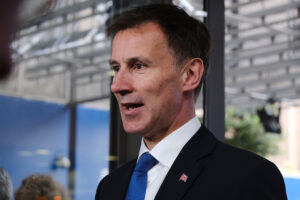
The Office for National Statistics reports that GDP grew by 0.3% during January, after shrinking by 0.5% in December.
That’s a faster recovery than expected after the economy stalled in the final quarter of 2022.
Analysts had expected modest growth of just 0.1% as strike action and the cost of living crisis prevented a recovery in consumer and business activity.
The latest GDP figure could give the chancellor, Jeremy Hunt, a slight boost before next week’s budget, when he will set out the government’s tax and spending policies.
It also adds to challenge facing the chancellor to meet his target to get government debt falling as a share of GDP. The country is the only one among its G7 peers that has not yet recovered its pre-pandemic size.
Darren Morgan, ONS director of economic statistics, said the economy had “partially bounced back” from the large fall seen in December.
“Across the last three months as a whole and, indeed over the last 12 months, the economy has, though, showed zero growth,” he said.
“The main drivers of January’s growth were the return of children to classrooms, following unusually high absences in the run-up to Christmas, the Premier League clubs returned to a full schedule after the end of the World Cup and private health providers also had a strong month,” Morgan added.
“Postal services also partially recovered from the effects of December’s strikes.” These factors were partly offset by a sharp drop in construction due to a slowdown in infrastructure projects and housebuilding, partly because of heavy rainfall.
A boost in spending during the football World Cup helped keep growth in positive territory in the final quarter of last year, Office for National Statistics figures show. The rise went against economists’ expectations to keep the UK out of a recession, which is defined as two consecutive quarters of negative growth.
The latest official figures will feed into the Office for Budget Responsibility’s outlook for the economy, which is due to be published along with the chancellor’s tax and spending plans on Wednesday. The official forecaster warned in November that the UK faced two years of record falls in living standards and is expected to downgrade its forecasts for growth in the medium term.
The Bank of England still expects a downturn this year but it is predicted to be shallower and shorter than previous estimates.
Hunt said: “In the face of severe global challenges, the UK economy has proved more resilient than many expected, but there is a long way to go.
“Next week, I will set out the next stage of our plan to halve inflation, reduce debt and grow the economy – so we can improve living standards for everyone.’’
Yael Selfin, chief economist at KPMG UK, said a recession is “still on the cards despite a brightening outlook”.
“The marked fall in wholesale gas prices and easing of supply chain disruptions provided a welcome boost to economic prospects at the start of 2023,” she said. “But this may not be sufficient to stave off a recession in the first half of this year, as consumer spending remains weak with households continuing to be squeezed by elevated prices and higher interest rates.”
Selfin added that the downturn is expected to be shallower and shorter than previously thought, with business confidence set to improve as inflation falls, supporting growth in the second half of the year.
Inflation fell to 10.1 per cent in January, down from a 41-year high of 11.1 per cent in October, and is expected to at least halve by the end of the year.
Ben Jones, CBI Lead Economist, said:“The slight rebound in growth at the start of the year wasn’t altogether surprising, given the sharp drop in December. But activity is likely to be subdued in the near-term, given the headwinds of high inflation, still-high energy prices and rising interest rates. However, sentiment is improving, and business leaders are hopeful of a more stable operating environment later this year.
“The government should use the forthcoming budget to overcome the prevailing economic headwinds by tackling the barriers holding firms back. This includes solving labour shortages by reforming childcare and helping bring more working parents back into the workforce, as well as finding a replacement to the super deduction ahead of the planned six-point increase in corporation tax.”
George Lagarias, Chief Economist at Mazars comments: “We can’t really say we are too surprised that UK GDP growth exceeded expectations for January. For one, consumers have been stronger than previously anticipated, as tight employment conditions mean that wage growth is somewhat catching up with inflation. Additionally, external demand from the big global economies, such as the US and China, has been stronger than expected.
“While the broader economic backdrop is probably the most difficult in a generation and we could see more weakness ahead, we think that pessimism at the beginning of the year may have been overdone. Having said that, we expect conditions to remain volatile and tepid until inflation comes down sufficiently.”
Read more:
UK economy returns to growth in January





